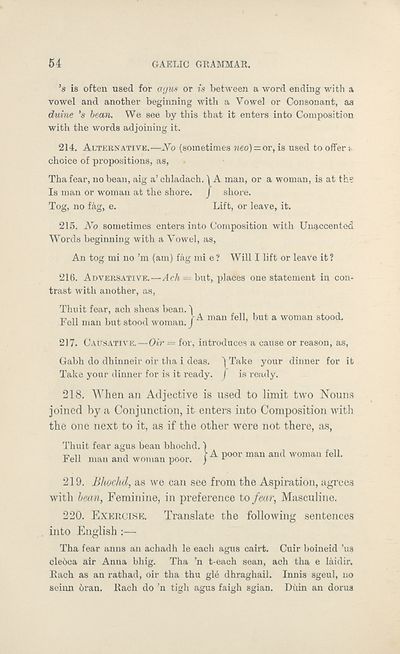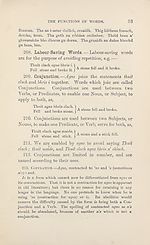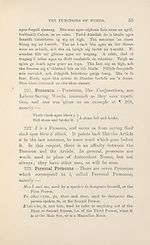Download files
Complete book:
Individual page:
Thumbnail gallery: Grid view | List view

54
GAELIC GRAMMAR.
’» is often used for a<ju» or is between a word ending with a
vowel and another beginning with a Vowel or Consonant, as
duine ’s bean. We see by this that it enters into Composition
with the words adjoining it.
214. Alternative.—Wo (sometimes neo) = or, is used to offer <
choice of propositions, as,
Tha fear, no bean, aig a’ chladach. 1 A man, or a woman, is at ths
Is man or woman at the shore. J shore.
Tog, no fig, e. Lift, or leave, it.
215. Wo sometimes enters into Composition with Unaccented
Words beginning with a Vowel, as.
An tog mi no’m (am) fag mi e ? Will I lift or leave it ?
216. Adversative.—.4cA = but, places one statement in con¬
trast with another, as,
Thu it fear, ach sheas bean, j
Fell man but stood woman./
fell, but a woman stood.
217. Causative.—Oir = for, introduces a cause or reason, as,
Gabh do dhinneir oir tha i deas. j Take your dinner for it
Take your dinner for is it ready. / is ready.
218. When an Adjective is used to limit two Nouns
joined by a Conjunction, it enters into Composition with
the one next to it, as if the other were not there, as,
Thuit fear agus bean bhochd. |
Fell man and woman poor, j ^ Poor
and woman fell.
219. Bhochd, as we can see from the Aspiration, agrees
with bean, Feminine, in preference to fear, Masculine.
220. Exercise. Translate the following sentences
into English :—
Tha fear anus an achadh le each agus cairt. Cuir boineid ’us
cleoea air Anna bhig. Tha ’n t-each sean, ach tha e Ikidir.
Each as an rathad, oir tha thu gl6 dhraghail. Innis sgeul, no
seinn 6ran. Each do ’n tigh agus faigh sgian. Diiin an dorus
GAELIC GRAMMAR.
’» is often used for a<ju» or is between a word ending with a
vowel and another beginning with a Vowel or Consonant, as
duine ’s bean. We see by this that it enters into Composition
with the words adjoining it.
214. Alternative.—Wo (sometimes neo) = or, is used to offer <
choice of propositions, as,
Tha fear, no bean, aig a’ chladach. 1 A man, or a woman, is at ths
Is man or woman at the shore. J shore.
Tog, no fig, e. Lift, or leave, it.
215. Wo sometimes enters into Composition with Unaccented
Words beginning with a Vowel, as.
An tog mi no’m (am) fag mi e ? Will I lift or leave it ?
216. Adversative.—.4cA = but, places one statement in con¬
trast with another, as,
Thu it fear, ach sheas bean, j
Fell man but stood woman./
fell, but a woman stood.
217. Causative.—Oir = for, introduces a cause or reason, as,
Gabh do dhinneir oir tha i deas. j Take your dinner for it
Take your dinner for is it ready. / is ready.
218. When an Adjective is used to limit two Nouns
joined by a Conjunction, it enters into Composition with
the one next to it, as if the other were not there, as,
Thuit fear agus bean bhochd. |
Fell man and woman poor, j ^ Poor
and woman fell.
219. Bhochd, as we can see from the Aspiration, agrees
with bean, Feminine, in preference to fear, Masculine.
220. Exercise. Translate the following sentences
into English :—
Tha fear anus an achadh le each agus cairt. Cuir boineid ’us
cleoea air Anna bhig. Tha ’n t-each sean, ach tha e Ikidir.
Each as an rathad, oir tha thu gl6 dhraghail. Innis sgeul, no
seinn 6ran. Each do ’n tigh agus faigh sgian. Diiin an dorus
Set display mode to:
![]() Universal Viewer |
Universal Viewer | ![]() Mirador |
Large image | Transcription
Mirador |
Large image | Transcription
| An Comunn Gàidhealach > An Comunn Gàidhealach Publications > Scottish Gaelic as a specific subject > (58) |
|---|
| Permanent URL | https://digital.nls.uk/125955713 |
|---|
| Description | This contains items published by An Comunn, which are not specifically Mòd-related. It includes journals, annual reports and corporate documents, policy statements, educational resources and published plays and literature. It is arranged alphabetically by title. |
|---|
| Description | A collection of over 400 items published by An Comunn Gàidhealach, the organisation which promotes Gaelic language and culture and organises the Royal National Mòd. Dating from 1891 up to the present day, the collection includes journals and newspapers, annual reports, educational materials, national Mòd programmes, published Mòd literature and music. |
|---|---|
| Additional NLS resources: |
|

